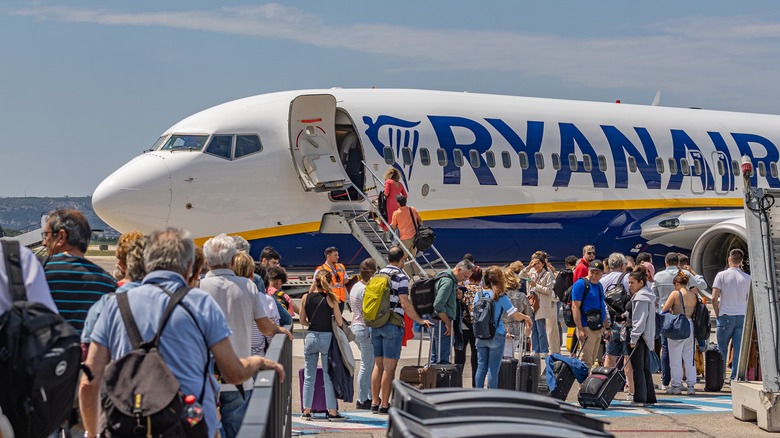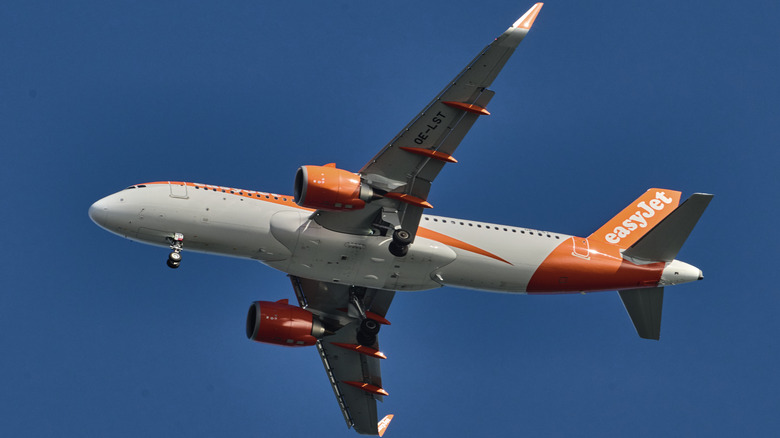The One Thing Rick Steves Says To Be Cautious Of When Flying Europe's Budget Airlines
Rick Steves has become synonymous with supplying top travel tips, especially for those hoping to plan a successful vacation in Europe. His treasure trove of tips ranges from avoiding getting pickpocketed to getting the most out of museum visits to even properly doing laundry in your hotel. And as far as flights go, he advocates the use of budget airlines to reduce travel expenses, but not without issuing a warning about their inflexible nature — no refunds, no changes, no exceptions.
Despite his travel empire raking in $120 million annually, you won't catch him lounging in first or business class. He's content with flying in coach, with his decades of exploring Europe making him grow to appreciate the back of the plane like the rest of us. "It never occurred to me that I'm suffering," he told The Washington Post. "As long as I've got an aisle and a seat that reclines, I'm happy." But despite being frugal in the air, he's candid about the pitfalls of low-cost flying. He said that if you book budget carriers, disruptions and operational hiccups are not a rarity.
"Many airlines take only online bookings, so it can be hard to reach a customer service representative if problems arise," he noted on his blog. And the worst part? If it's not you canceling the flight — the airline might. "It's not uncommon for budget carriers to unexpectedly go out of business or cancel a slow-selling route — leaving you scrambling to find an alternative," he warned.
Be wary about extra costs
Booking budget airlines might seem like a steal, but you're essentially just paying the carrier for no-frills transportation. Anything beyond securing your spot on the plane will likely come with a price tag, according to Steves. If you want to check a bag, munch on some in-flight grub, and enjoy other amenities the airline has to offer, be prepared to shell out extra. With airlines perfecting the art of upselling, you might even have a hard time saying no.
"Since budget airlines are not making much money on your ticket, they look for other ways to pad their profits, such as charging for food and drink, priority boarding, seat reservations, checking bags, and checking in at the airport (instead of online)," Steves advised on his blog. "With a little planning, a few sacrifices, and light packing, travelers can avoid most of these costs."
To put things in perspective, consider the Ireland-based budget carrier Ryanair, which charges anywhere from 18.99 to 59.99 euros (roughly $20 to $65) for a 20 kg checked bag if you pre-pay online. Wait until you're at the airport, and you'll be hit with a fee of at least 44.99 euros. Meanwhile, traveling with an infant on England's EasyJet? That'll be an extra 25 euros (about $27), even if the child spends the entire flight on your lap. And so, while you'll be paying less for your flight, the final cost can add up significantly before you even step on the plane.
Booking budget airlines can make for a more fulfilling experience
Another downside of booking flights with budget airlines is that sometimes you'll have no choice but to land at smaller airports away from your intended town or city. Steves even warned on his blog that in some cases, you may find yourself having to touch down in an airport about an hour away from where all the action is. This could be inconvenient for those on a tight schedule, but it might be a blessing in disguise for more flexible travelers, offering a chance to explore other areas.
"Just getting close to your destination can be a benefit. For instance, if you're headed for Florence, but there's no direct cheap flight, you can look for one that goes to Pisa, which is 1-1/2 hours away by train," Steves advised in a piece on Travel Agent Central. "You'll pay for the train ticket from Pisa to Florence, but you'll get to see the Leaning Tower."
In fact, you may even want to sidestep famous European cities altogether and explore the other cities surrounding them instead. He even has coined a term for them: Second cities. "These second cities are feisty," he told JourneyWoman. "Going there will save you money. You'll be away from any crowds. And you'll be feeling the pulse of that country today. Every place in Europe has sort of a rough working class, industrial rust-belt kind of city that right now is energetic, and coming back with gusto."


